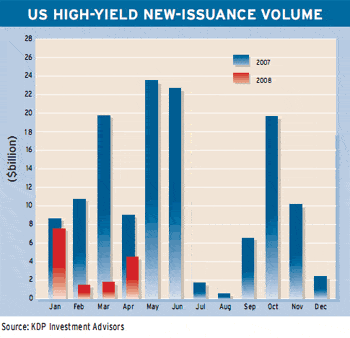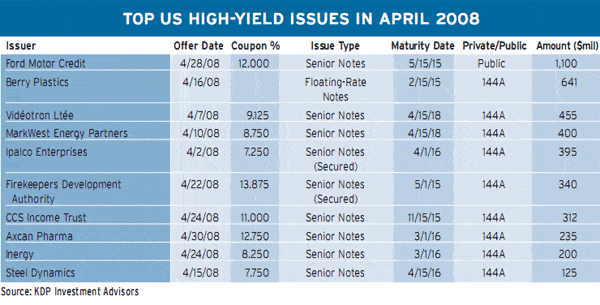CORPORATE DEBT
 |
The latest bank lending surveys by the Federal Reserve and the European Central Bank (ECB) demonstrated that credit standards have tightened further, indicating that the credit crunch hasn’t lost its bite, analysts say.
While recent weeks have seen record corporate bond issuance, is this due to issuance backlog and the anticipation of worse to come, or a fundamentally improved willingness to extend credit? Lending standards surveys can be very informative in this regard, according to Barclays Capital. Tighter lending standards have historically been a leading indicator of increasing high-yield default rates and lower new-loan growth rates, as well as for wider credit spreads.
The Fed’s latest bank lending survey revealed more compelling signs that economic weakness is reinforcing credit restraint and provided fresh evidence that banks’ lending capacities are strained, says Robert DiClemente, chief US economist at Citi. “These developments undercut arguments that policy is accommodative and will keep alive doubts about the timing and scope for an economic rebound,” he says.
The toughening in lending terms and standards encompasses a majority of banks, domestic and foreign, DiClemente says. “In particular, the net percentages of domestic banks reporting tighter standards were at or near historical highs for most loan types,” he says.
“Importantly, the April survey tends to reinforce concerns that a negative feedback loop of interacting financial and economic weakness could delay recovery,” DiClemente says. Unlike January, when only a handful of banks surveyed indicated they had tightened because of weakened capital positions or concern about their own liquidity, this time around almost 35% of domestic banks and 45% of foreign institutions noted such concerns.
For the first time in this loan cycle, DiClemente says, the tightening in bank credit also has spread to credit cards and other consumer loans. One-third of respondents reported tightening standards for credit cards, up from barely 10% in January.
The ECB’s senior loan officers’ survey showed a similar deterioration in credit availability, as well as demand for bank loans. Demand for loans by businesses in the first quarter of this year fell to the lowest level since April 2004. The ECB said the decline reflected trends in merger and acquisition activity, as well as lower demand for funds for fixed investment.
The Bank of England says it is worried that UK banks have overstated their exposure to mortgage-linked investments and that this could delay an end to the credit crunch. Banks that previously were too willing to lend have now become too cautious, even with creditworthy borrowers, the central bank said.




